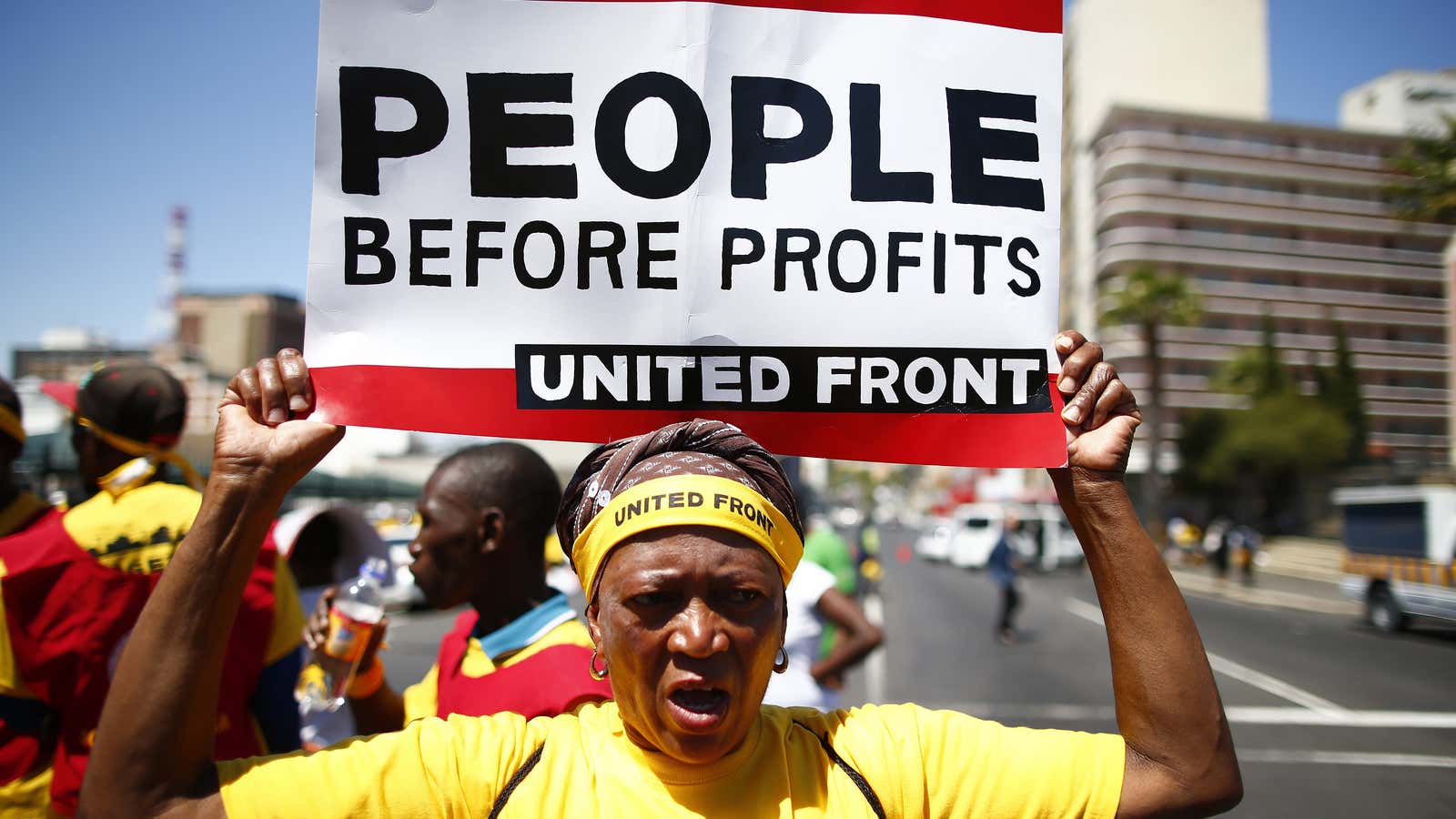A former president of the United Nations general assembly creates an offshore trust that gets a lucrative airport contract in Uganda, benefitting both him and his daughter. An opposition figure in Zambia is listed as director in an overseas company that has interests in mining and nickel exploration. And the brother of Ghana’s former president is the head of a company that does consulting for the west African nation’s oil and gas development.
These are some of the revelations from Africa documented in the Paradise Papers, a global investigation into the offshore transactions of some of the world’s biggest corporations and wealthiest people. The cache of secret records was leaked from Appleby, a Bermuda-based law firm that provides legal advice to business elites. Together, the 13.4 million documents shed light on the top end of the world of offshore finance, and how the politically powerful take advantage of the system, deal in corruption and bribery, and avoid paying taxes.
The leaked documents also show how multinationals, who are often accused of plundering national resources, continue to gain access in Africa. For instance, at the Democratic Republic of Congo, the Paradise Papers show that the mining multinational Glencore gave the Israeli billionaire Dan Gertler a $45 million loan if he secured a mining contract from the government. Gertler was previously mentioned in a UN report for giving money to the DRC government to buy weapons and finance its war in exchange for a monopoly on the country’s diamonds. In Burkina Faso, Glencore protested after officials sought $29 million in unpaid taxes and penalties, eventually paying only $1.5 million.
According to the papers, Nigeria’s current central bank governor Godwin Emefiele, then a top executive at Zenith Bank and his boss, Jim Ovia, were involved in an £11 million ($14.5 million) VAT avoidance scheme by buying luxury jets for the bank through an offshore company.
African oligarchs and elite businesspeople have often extracted wealth from their nations and stored it outside the continent—often going abroad to get education, medical treatment, and vacations. And while having offshore companies and trusts does not imply wrongdoing, it raises issues about fairness, ethical dealings, and conflict of interest. It also raises an important question about growing inequality, and how the burden of taxation has shifted towards the middle and low-income people instead of rich corporations.
Bukola Saraki – Nigeria. The head of Nigeria’s senate, Saraki was the director of Tenia Limited, a company established in the Cayman Islands in 2001. Saraki was previously investigated for using public funds to acquire private property, after which a tribunal dismissed charges against him. Saraki said the case against him was politically motivated and told the International Consortium of Investigative Journalists (ICIJ) that there was “nothing unlawful in the ownership of offshore companies.”
Ibrahim Mahama – Ghana. Ibrahim is the brother of the former president of Ghana, John Mahama. As the head of the private engineering firm Engineers & Planners, Ibrahim is under investigation by Ghana’s economic and organized crimes office for issuing dud checks. In 2013, representatives of Mahama contacted Appleby to create offshore companies that would provide consulting in the oil and gas industry besides real estate. Appleby listed the company as high risk given Ibrahim’s relationship with the then-president and allegations that the government was repaying the company’s multimillion-dollar loan. A company representative has declined any wrongdoing.
Sam Kahamba Kutesa – Uganda. Kutesa has been the foreign minister of Uganda for 12 years now, and was president of the UN general assembly during its 2014-2015 session. In 2012, he created the Obuyonza Discretionary Trust in the Seychelles; his daughter, Ishta, also listed as a beneficial owner as well as a future recipient of money from the trust. The company provided consulting and airport services in Uganda, and Kutesa also provided ground-handling services at Uganda’s Entebbe airport through his other company Enhas. Kutesa told Appleby that the purpose of the trust was to separate his government income “from his personal assets and belongings.”
Kutesa says he has nothing to hide and told the Daily Monitor newspaper in Uganda that he established the companies, but “I have never done anything with it at all. I told Appleby to close it many years ago.”
Ellen Johnson Sirleaf – Liberia. Appleby’s files show that Liberia’s president was listed as a director of a Bermuda-based financial company up until 2012. Songhai Financial Holdings is a subsidiary of Databank, a financial services firm where Sirleaf served as a director before she became president. Stephen D. Cashin, a board member of Databank, says that Sirleaf resigned from the company before her election, but her leave was “not effected” until 2012 due to “an administrative oversight” in Bermuda.
Sally Kosgei – Kenya. Kosgei served as both a cabinet minister and member of parliament in Kenya. Kosgei owned Zonrisa, a company registered in the Isle of Man under the name Aisha Limited. Zonrisa owned a $1 million apartment in central London near Harrods department store in 2001, when she began work as the cabinet secretary in the office of the president. Kosgei defended the purchase saying there was “no relation whatsoever” between the purchase and date of her work. She also told ICIJ that she acted on her lawyer’s advice.
